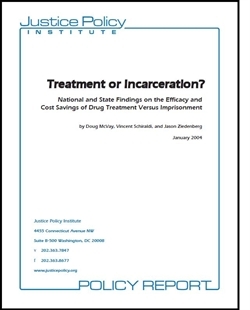
This policy brief will survey research that shows that, on the whole, providing drug offenders with treatment is a more cost-effective way of dealing with substance addicted drug and nonviolent offenders than prison. Studies by the nation’s leading criminal justice research agencies have shown that drug treatment, in concert with other services and programs, is a more cost effective way to deal with drug offenders. And in Maryland, several promising programs have shown that drug treatment, combined with life skills training, literacy training and education, and job skills training, is being used with a high degree of success. This policy brief provides the Maryland General Assembly and Governor Ehrlich with additional support to follow up on the pledge the governor made in last January’s “State-of-the-State” address to, “work together to get nonviolent drug offenders out of jail and into treatment programs, where they belong.”